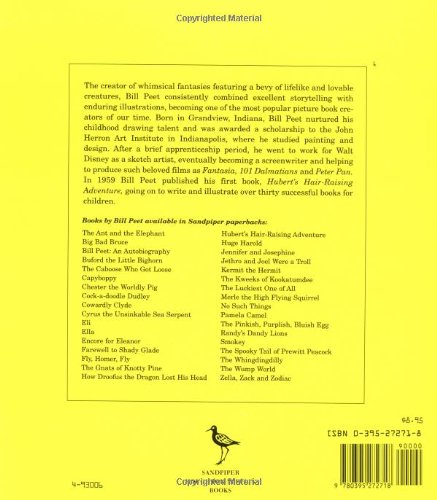Chester the Worldly Pig
₱847.00
Product Description
Chester longs to be a performer in the circus, but the road to stardom is rocky until someone discovers Chester’s true “worldliness.”
Review
“Chester is going to be a laugh-aloud choice.” Kirkus Reviews
From the Back Cover
The creator of whimsical fantasies featuring a bevy of lifelike and lovable creatures, Bill Peet consistently combined excellent storytelling with enduring illustrations, becoming one of the most popular picture book creators of our time.
About the Author
Bill Peet was the author of 34 books published by Houghton Mifflin. One of these, BILL PEET: AN AUTOBIOGRAPHY, was named a 1989 Caldecott Honor Book. All of Bill Peet’s books published by Houghton Mifflin Company, including his first book for children published in 1959, HUBERT’S HAIR-RAISING ADVENTURE, remain actively in print today.
In both his career as an author and illustrator of children’s books and in his work as sketch artist and continuity illustrator at Walt Disney, Bill Peet created a menagerie of memorable characters. As he himself noted, “I write about animals because I love to draw them. Most of my animal characters have human personalities, and some are much like the people I know.”
At Walt Disney, where Bill Peet worked for 27 years, he was a key participant in the production of classic films such as Fantasia, Sleeping Beauty, Alice in Wonderland, Peter Pan, and 101 Dalmatians for which he was not only an artist, but the screenwriter as well.
Bill Peet’s signature style enabled him to create fast-paced stories of fantastical adventure delivered with warmth and laugh-out-loud hilarity. His unfailing humor did not, however, prevent him from addressing such poignant issues as kindness toward others and respect for the environment. Through the exploits of his characters, Peet offered his audience a chance to see themselves and their world through new eyes.
“At some point,” Bill Peet once said, “it occurred to me that drawing was something I couldn’t possibly give up, and somehow it must be turned into a profession.” He went on to not only fulfill his dream but to introduce generations of young readers to his delightful vision of humor, friendship and compassion.
Excerpt. © Reprinted by permission. All rights reserved.
great theorist of the free market believed in Providence. “The happiness of
mankind,” Smith wrote, “seems to have been the original purpose intended by
the Author of nature.” The workings of the Lord could be found not in the
pages of a holy book, nor in miracles, but in the daily, mundane buying-and-
selling of the marketplace. Each purchase might be driven by an individual
desire, but behind them all lay “the invisible hand” of the Divine. This invisible
hand set prices and wages. It determined supply and demand. It represented
the sum of all human wishes. Without relying on any conscious intervention
by man, the free market improved agriculture and industry, created surplus
wealth, and made sure that the things being produced were the things people
wanted to buy. Human beings lacked the wisdom, Smith felt, to improve
society deliberately or to achieve Progress through some elaborate plan. But
if every man pursued his own self-interest and obeyed only his “passions,”
the invisible hand would guarantee that everybody else benefited, too.
Published in 1776, The Wealth of Nations later had a profound
effect upon the nation born that year. The idea that “life, liberty, and the
pursuit of happiness” were unalienable rights, endowed by a Creator, fit
perfectly with the economic theories of Adam Smith. “Life, liberty and estate”
was the well-known phrase that Thomas Jefferson amended slightly for the
Declaration of Independence. The United States was the first country to
discard feudal and aristocratic traditions and replace them with a republican
devotion to marketplace ideals. More than two centuries later, America”s
leading companies—General Motors, General Electric, ExxonMobil,
Micr











